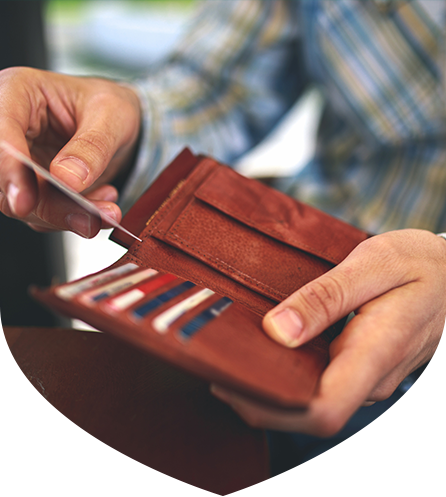Financial Wellness
Are Public Wi-Fi Networks Safe? What You Need To Know.
Cybersecurity has become one of the biggest hot topics inside technology circles. But there is a longstanding misperception that cybersecurity is beyond everyday people and should be left to the professionals. Moreover, there is a prevailing sense among the public that hacks and breaches are simply a fact of life and we should just learn to deal with them. This just isn't true. In fact, every day people have a huge role to play in cybersecurity threat prevention, detection, and remediation.
One example of when to keep your guard up is when using public Wi-Fi networks.
For anyone who travels or works remotely, public Wi-Fi is part of life. Whether you're in the airport, on a business trip, at a coffee shop, or any other place with access to public Wi-Fi, the service can be a lifesaver—helping you stay connected. But along with convenience, public Wi-Fi hotspots can also provide an easy way for identity thieves and cybercriminals to monitor what you're doing online and to steal your passwords, your personal information, or both.
How you know your information is safe
When you connect to a website, information travels from your device to the website. That could include sensitive data like the log in information for your financial, email, or social media accounts.
In the past, if you used a public Wi-Fi network to get online, your information was at risk. That's because most websites didn't use encryption to scramble the data and protect it from hackers snooping on the network.
Today, most websites do use encryption to protect your information. Because of the widespread use of encryption, connecting through a public Wi-Fi network is usually safe.
How do you know your connection is encrypted? Look for a lock symbol or https in the address bar to the left of the website address. This works on a mobile browser, too. It can be hard to tell if a mobile app uses encryption, but the majority do.
How to avoid compromise
Convenient access on the go knowing you have encryption protection is comforting; however, these networks aren't perfect and could still leave you vulnerable to cyberattacks. Cybercriminals use a combination of technical know-how and free tools to sneak into unsecured networks and steal sensitive information. This could include passwords, banking information, or personal data that can be used for identity theft.
Where the hacks occur
Planning a summer getaway? You might soon be at an airport or bus station, or on a train. This is when you need to be most vigilant. According to research by NordVPN, one in four travelers have been hacked when using public Wi-Fi while traveling.
A recent study by Forbes Advisor gives these most common free access-points/places where info is often stolen:
- Cafe or restaurant 25%
- Airport 23%
- Hotel 20%
- Fast food restaurant 19%
- Library 19%
- Public transportation 17%
- Retail store 12%
- School 9%
- Traveling internationally 5%
Best practices to protect yourself
- Verify the network. Ask the front desk staff at the business the exact name and password to use and its wireless network name.
- Be careful what you do. Experts recommend that you don't use public Wi-Fi to do online banking, make purchases, check email, or use social media. It is usually okay to browse the web and check the news or the weather.
- Nix Wi-Fi and Bluetooth. Turn these off when you are not using them.
- Use a VPN. The best and most effective way to ensure travelers' security over an open Wi-Fi connection is by using a VPN service. It encrypts data and doesn't allow third parties to intercept a user's data.
- Disable automatic connections. This will prevent you from connecting to the network you didn't intend to.
- Use two-factor authentication. When you're using public Wi-Fi, cyber snoops could gain access to your passwords. One way to enhance your protection is by enabling two-factor authentication (2FA) on any services that offer it. Use an authenticator app as an added layer of security or use a biometric login on your device.
- Lock down your device. Exercise physical security in any public place. Do not leave devices unattended. Beware "shoulder surfing," a technique where an attacker covertly looks at your screen or tries to listen in when you enter sensitive information into an app or website. Don't be caught off-guard—use biometrics to log into your accounts, or use a privacy screen to protect your information.
- Don't share your credentials. Don't go to sites where you need to put in a username or password. There might be down times while traveling when you'd like to check your email or login to confirm your hotel stay while waiting for a flight. However, this does make your data more vulnerable, so don't do it while connected to a public network. An attacker might capture your banking credentials or credit card information.
- Remember to log out when done. Once you are finished using online accounts, you should always log out of them to close out of your connected session.
Advice from the FTC
The Federal Trade Commission (FTC) offers this advice about Wi-Fi scams:
Recognize the Source. Scammers pretend to be someone they're not, like a representative from a well-known company or the government, to rip you off or steal your personal information. They also create fake websites and encrypt them to make you think they're safe when they're not. If you visit a scammer's website, your data may be encrypted on its way to the site, but it won't be safe from scammers operating the site.
Report Scammers. Report scammers to the FTC at ReportFraud.ftc.gov.
Resources: The Federal Trade Commission, Forbes, Consumer Reports, Norton, Money Talks News, KnowBe4, Inc.


